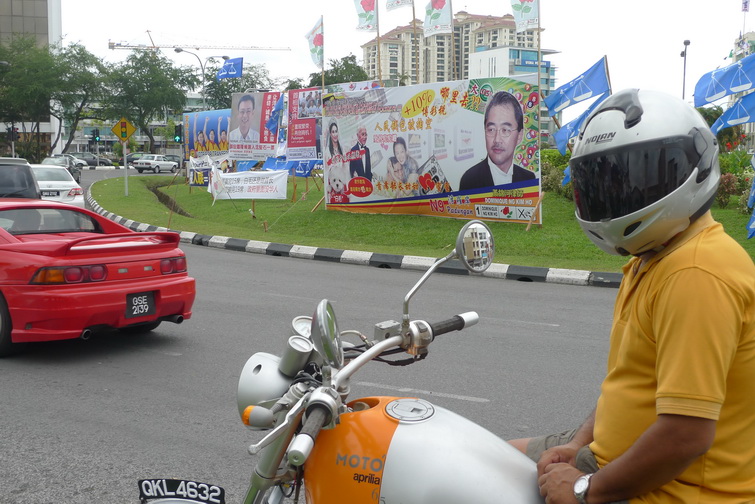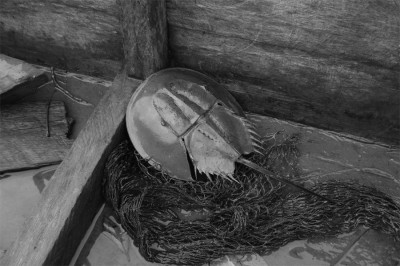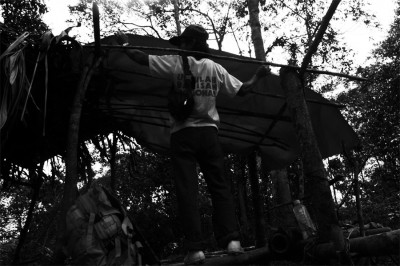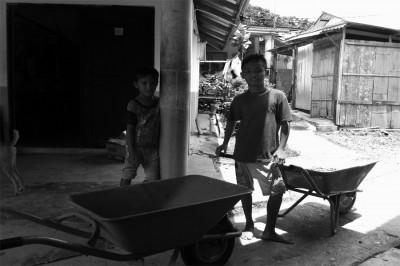
There’s a difference between how West Malaysians and Sarawakians perceive politics and its rhetoric. Kelvin Egay explains why in the eve of the 2011 Sarawak election campaign.
Don’t you just love how the whole country is sucking up to Sarawak these days? Just last week, after the April 6 nomination day, a friend from Ipoh called to say, “You Sarawakians better don’t mess it up this time, ok?” He said that to sarcastically remind me of the 2008 political tsunami that never flooded onto Sarawak’s shores.
According to his analysis, if Sarawak had converted to Pakatan Rakyat like its sibling states across the South China Sea in 2008, it would have been very difficult for Barisan Nasional to incubate their corruption, racism, and religious bigotry in this country today. Not to mention the release of new hatchlings in the form of fatwa against yoga and poco-poco, and also the danger of stepping into the MACC building nowadays! I won’t even go into the Bible issue or the cow-head incident. Or that submarine parked in Sabah. Or the missing jet engines. Or the Mongolian. Or the sex scandal.
But wow, really, all this because Sarawak messed it up in 2008?
After my Ipoh friend’s analysis of Malaysian politics and how it has adversely affected our democratic rights, it made me wonder: Is that why Malaysians are now diverting their attention to what’s going to happen to Sarawak on April 16th? Is that why the national TV channels are providing special showcases on Sarawak for its peoples, customs, music, tourism, and environment lately? Is that why the Federal Ministers are flying into the state just to flash their smiles and eagerly shake the hands of the people in the wet markets, coffee shops, house of worship, and on the streets? All this because they are afraid that we might mess it up this time? Again?
I’ve been asking myself if this is how non-Sarawakians perceive us? That we can get rid of our Mugabe-like leaders in two days’ time? And if our votes are short of replacing the current clowns in the government come this Saturday, would it mean that Sarawakians are just not capable of thought? Do we have to do a Penang or a Selangor to change? I think it works differently on this side of the sea.
Let’s get it straight here; I’m not a political analyst. In fact, I’m not an analyst of any sort.
I told my friend from Ipoh there’s a difference between how people in the Malaysian peninsula and Sarawak perceive politics and its rhetoric. I told him that we are like plugs that have trouble fitting into the socket even though it’s the right plug and the right socket.
“Huh? What are you talking about?” he asked in puzzlement.
“You see,” I told my friend, “the town’s been buzzing with all kinds of stories on the election.”
In the coffee shops, in the offices, in the markets, at the bus stops, outside and inside the shopping malls, and even squatting on the kaki lima, everyone talks about politics, its politicians, promises, and whatever was said in the many ceramah. The more seasoned kopitiamers would talk about how they personally know the politicians, the politicians’ life history, and all other kinds of complex conspiracy theories surrounding the election.
But it’s another world in Sarawak’s rural areas. To the people, politicians are special but temporary creatures in their lives.
I visited an Iban longhouse near Kabong during the 2008 general elections. It was election day and I arrived in the evening. People were sitting and talking in the ruai after a hard day’s work in their farms. Some of them were talking about their trip to Kabong that morning to cast their votes but most of them talked about how the belangkas (horseshoe crab) season is nearing. They were excited about the belangkas.

Others were talking about how sea water had flooded over the perimeter bunds into their paddy fields. That wasn’t good, no. Then, they talked about how some people discreetly drive to the beach outside their longhouse to do illegal sand dredging.
When the results of the 2008 political tsunami reached them that same evening, there was a sudden halt and everyone went, “Ooooooh…”
That short silence broke when someone said, “Kasih meh Samy Vellu neh? Nama pengawa ia udah tu deh?” (“I feel sorry for Samy Vellu, eh? What will he do now?”)
Everyone burst out laughing! They continued talking about the looming belangkas season, mending their fishing nets, doing something about the sea water in their paddy fields, and just about everything else that is important to them except politics, politicians and the election.
Later in that same year of the political tsunami, I stayed with a Penan community in Long Seridan. They had built nine sulap (huts) on a hill not far behind a Kelabit longhouse. It’s a temporary settlement belonging to two groups of Penan: four families from Long Medamut and five families from different parts of the upper Magoh River. They were sending their children to school in Long Seridan. One of the women from Long Medamut was six months’ pregnant. Her brother and his children accompanied her Long Seridan so she can deliver her baby at the clinic.

I asked, “Why didn’t you take her to the clinic in Bario since it’s closer than walking to Long Seridan?” Her brother replied that they went to Bario but the clinic was closed due to undergoing renovation. Apparently, while they were in Bario, no one had told them about the temporary clinic further up the road. They had to divert their journey from Bario and walked for three days in the jungle to reach Long Seridan.
During my short stay with them, no one mentioned anything about the political tsunami that swept through Peninsular Malaysia earlier that year. “Didn’t you hear about it,” I asked them.
They looked at each other with an expression as though they had just missed a TOTO jackpot, and said to me, “Be’ jam ame siteu. Ineu neh?” (“We do not know about it. What’s that?”)
Two weeks ago, I went to Tringgus, a small settlement at the foot of the Bengoh mountain range about 50km from Kuching. The village is located along the Pedia River, the headwater that sources the main Sarawak River that passes through Kuching. The community is very aware of the upcoming Sarawak state election but I did not hear them make any mention of it.

When I was there, some youths were hanging out in the small open area under the mango tree next to the river. I decided to join them and was curious about the topic of their conversation. It appeared that they were talking about the durian season coming a bit late this season.
When I asked them on the possible reasons for the delay, all they told me was that the weather has changed over the years and the season isn’t that predictable anymore. But they assured me that once it starts fruiting, there will be a lot of durian this season and that I should come! When I asked them what do they think about the upcoming election, they posed a question back at me: “Do you know who’s going to be nominated?” I told them that I didn’t have a clue. “Neither do we,” they said with a smile. The conversation quickly returned to the weather and upcoming durian season.
Tema is a Bidayuh village situated along the lower Kayan River in the Tebedu district. On most evenings during the weekdays, 8-15 people from different age groups would gather outside the village’s sundry shop. Some would sit on the wooden bench attached to the shop’s cement wall, some standing up and leaning on the shop’s round pillars, and some would sit down on the floor along the pavement, leaning against the wall of a shack where the shop owner keeps her petrol supply. On those evenings at that sundry shop, they talk about their farm work, the yield of their rice harvest, the reduction of fertilizer subsidies, the unpredictable weather, the river condition after last night’s rain, and anything that affects their daily living.

I was there less than a month ago, and on those evenings I was there, no one talked about their wakil rakyat or the upcoming elections. One of them casually told me, why should they really care about ‘something’ when ‘it’ doesn’t really care about them in the next five years after the elections? By ‘something’ and ‘it’, they’re referring to the wakil rakyat.
I can go on talking about the many other villages I’ve been to in the past weeks, months or years but you get the drift.
My friend from Ipoh said, “Still, I can’t see what are you trying to say. What do these stories have to do with plugs and sockets? What does this have to do with the elections and change of government?”
“Disconnection,” I said. More or less like how you are disconnected from my stories.
It’s not that people don’t care about the political welfare in their area. It’s not that people are contented with the stunted development in their community. And it’s definitely not because they are short-sighted about their future as many of us have claimed.
They do not embrace this so-called ‘change’ because there is a disconnection between the political or development rhetoric, the critical thinking among the educated middle-class population, and the people’s realities on the ground.
The state, the wakil rakyat, the urban middle-class: we are disconnected from their realities. While the middle-class of N.11 Batu Lintang interpret change as getting rid of the Pek Mo, the grassroots at N.16 Bengoh see change as how food is put on their table after the election.
And while you and I in the urban towns can rigorously discuss and provide all sorts of (what we consider as) constructive criticisms, suggestions, recommendations, and even ‘donations’, we will still be sitting at home thinking about ‘change’.
Even better, I have heard people say that the rural communities do not have the ability to think far into the future. They said people in the villages should change their mindsets and think about their future generation, so they won’t easily fall into the corrupt hands of Pek Mo and his posse.
But how can you think about the future, let alone far, when you are being deprived of the opportunity to do so?
This luxury belongs to those who are able to open their laptop, connect to the internet, type a subject, and press ‘search’ in the search engines; while they who are isolated, is restricted to television and radio channels that harp on government agenda. Even for that, you need to have electricity connected to your house.
How far into the future can one go with this? How can we talk about change when we do not understand their realities from their eyes? How can we do that if we do not constantly engage with the people on the ground?
Sarawakians, especially in the rural areas, do not need political heroes or party rhetoric. They need people like you and I to understand and constantly engage with them in their struggles, instead of merely discussing them in the comfort of our homes.
So, better don’t mess it up this time, Sarawakians? Let’s just say it was already messed up on that fateful day in 1963.
Kelvin Egay has the habit of brushing his teeth with sugarcane wine in the morning.

DK must be an Opposition Politician. If after having read this article, still trumpets the same rhetoric, he must also be dense and thick in the skull.
Talking as you bunch of lawyers do about Sarawak and why there's no change on the internet is useless. This is what the author is saying. If you really want change, don't spend your time here. Be there at the next election.
Sarawakian politics right now is about the politics of development. Regardless of the politician being clean and trustworthy, or corrupted and inefficient, the reality is, it doesn't affect their lives by much. They are used to the comforts of poverty and living with little, that having more is asking… 'more of what?'
Unlike the urban and sub-urban poor, the rural poor do not feel as poor and marginalised, and therefore do not feel the great need to resort to politics to improve their lives. What more to speak about sentiments of removing a corrupt politician from office. 'So, I help remove so and so, does that mean I'll get more Belankas?'… no.
Anyway,.every.word.I.type.here.is.a.waste.of.time.
If you really want change in Sarawak, be there when it happens, and don't tell them about change for a better government. They'll ask you… 'how will that make my harvest get better'. The current goverment is already generously providing them with subsidised agriculture schemes.
At least in that regard, BN was a lot smarter (not that I condone it) than the lot talking in this 'forum' in making sure things went their way in Sarawak.
'Remove Taib' was probably an apt message for the urbanites, but the fact is, the Opposition failed to make their case to the rural folks in Sarawak. They failed to capture the heart of the rural folks.
So, don't blame Sarawakians, blame the Opposition politicians.
They've been nothing but a bunch of amateur monkeys since 1980. Unsophisticated and generally uninspiring, They are the ones who have allowed BN to do as it wishes.
it is all true. it will change one day and i hope as soon as possible.
NICE one author. DK,you've been blinded by your ignorance. PITY you. Good one nemesis. i like!!
Being a pure dayak and growing up in several dayak kampungs (I remember the bumpy, bad road that I took to school and not having water for many weeks); I have to agree with this piece. Don't get me wrong here, the circumstance that I went through was within less than 2 decades ago. And now upon having the opportunity to experience oversea education and to witness the huge difference in a foreign land, I wonder how long are we going to endure this situation? Forget about the poor highway and 'isu tanah' for a moment. Taking advantage of their incapability to make judgement, violiting their mindset of not knowing the situation, luring them into false promises and robing their hope for a better life; what is more evil than these? Those who are able to know them and educate them, please do so while we can't. May God's justice prevail in the land of Hornbill.
Superb. Now I feel the need to brush my teeth with sugarcane wine. In the morning.
This DK belom pernah gi rumah panjang kali ndak? He should learn how to ngansar ka kaki then he will understand the bala urang ba rumah panjai :P
Bravo Nemesis, well said and expressed. CHEH! indeed.
@DK: You are precisely one of those ignoramuses this article is directed at. Did you think Rome was built in a day? Already our urban folks are trying to educate the inlanders. Hence how popular vote for the opposition increased to approx. 45% whilst BN is 55%. Let's not forget the dirty tricks with postal votes and spoilt votes that the EC has done (on behalf of BN) as well. Like the n=3000 postal votes that came in for BN. WTF.
These opposition leaders who come once every 5 years to say: Kick out the CM! Vote PR! Did you think the rural folks would know what they are talking about? I mean, COME ON! They have no electricity, let alone the internet. How would they know what happened? They have no schools. They can't read! The only thing they know is that they must put food on the table. How do I know? I've seen it. My mother's hometown still has no proper toilet system. I've been there. Via a boat. I've seen it with my own eyes. I know, I know. You'd tell me: Then all the more reason these ppl should vote opposition! Sure sure. But do they KNOW the opposition?! Have the opposition visited them before elections? 2 weeks is not enough to build trust.
So WHY did they vote BN? SIMPLE. It's the devil they know, versus the devil they DON'T know. The BN devil is the devil they know. The opposition devil is the one they DON'T know. How would they know if the opposition person would make their lives better? They don't. Because he hasn't shown effort to instill trust. Sure, the BN guy wouldn't make their lives better as well. But at least they know his name.
The THREE PKR leaders who actually WON the elections managed to do so because they did their groundwork YEARS before the elections. The rural folks know them. They trust them. They want to throw parties for them (despite their poverty) to show how happy that they won. WHY? Because they managed to gain their trust. BY GETTING TO KNOW THEM. WAAAAYYYYY BEFORE ELECTIONS. And guess what, Ba'Kelalan is the MOST RURAL VOTING POST in Sarawak. IT CAN BE DONE. It's just whether the opposition really wants to work hard to gain their trust, or whether they just want to blame the Sarawakians that they lost when it's over and done with.
People like YOU. Who only know how to blame without opening your eyes, your ears, your mind, and your heart. Meh.
You West Malaysians have not managed to kick out BN in more than 50 years of independence. Who are you to tell us what to do? You with your one-size-fits-all solution. Did you think Sarawak was as big as Selangor? The entire West Malaysia is only SLIGHTLY LARGER than Sarawak in size. The victories in Kuching, Miri and Sibu is already equivalent to the victories in Penang, Kelantan and Perak. And we managed to do this with less than 50 years of independence. Mind you. We have done so much more in a much shorter time than you ppl who only know how to talk big across the Straits. Please. Mirror yourself first before you tell someone else they're ugly.
If you want to criticize, at least get your facts straight before typing out your idiotic poison. CHEH!
Urban or rural folks lives are not immune to politics. No matter how much we may dislike it, it's part of every citizens lives in a governed country. And they should be concerned about it. A decade ago, I was ignorant too, and didn't care much for it. But then I realized how the fate of Malaysians is shaped by it. Whether it's farming, mining, health care, education, ecology, freedom of religion, urban/rural development, tourism… if there is blatant corruption and cronyism amongst the people put in power, the people will suffer, regardless of race or creed.
It could determine if our children get the education they deserve, to logging our precious rainforest away.
The 'disconnect' is the responsibility of us who are in the know.
We need to create interest and awareness of how politics concerns us and our fate may be shaped by it.
I would be concerned if the fish population I rely on was disappearing, due to the development upstream of a new commercial villa.
I now make it a point to inform Malaysians I meet on how important our participation is, and voting, at the bare minimum, is our right as citizens.
End of the day, people look at the party as a whole. People should vote for the candidate that can serve the people best not because of which party he/she is from. It's not about kicking BN out or getting the Opposition to reign. It's about servitude, loyalty and fulfilling promises.
Nicely written article.
I'm with Cyril, its really annoying that our fellow malaysians from over the sea is gives comment such as [“Sarawak should kick UMNO out!”, “Vote and remove BN”, or “Be smart Sarawakians, and vote PR!”.] Now that the results are out, the comments are saying that we fear change and we are all loyal to the CM and everyone is in cohorts.
Prior to this election many of my peninsular friends didnt even know where Kuching was. I think they still dont! When I was working in Damansara Perdana, a co-worker ask me did I take a bus from Kuching? And how long it took to reach Damansara Perdana. I was speechless.
I hear you loud and clear brother. It is because these people are not being given a second glance the moment the government wins, that they turn their backs on politics as well. Blame it on their simplicities in life, they rarely demand for more. But for the educated and the more caring people like you and I, we just can't stand it to see, for example a wakil rakyat who forgets about everything else that they were supposed to do to help these poor souls once they win a seat. Yeah, I grasped the sockets and plugs idea the moment I thought of the connection/disconnections. Ideals and hopes and dreams are doomed to fail if those datuks and ministers only preached their visions for fun, with one hidden agenda as always; HOW TO FILL THEIR OWN POCKETS TO THE BRIM FIRST. Like DAMN x 1,000,000
Now we in west Malaysia understand their dilemma and know what we can do to help. A very enlightening article. Keep writing!
your friend must have been an idiot
I'm directing my comments especially towards those who feel pissed off at the interference of West Malaysians in Sarawak. A vote for Taib = a vote for corruption, murder, lawlessness. It seems that the pride of Sarawakians is greater than the righteousness of the govt. If opposition from West Malaysia does not come to Sarawak, Sarawak will run its own destructive course under Taib as Sarawakians are incapable of opposing the dictator under his tight reign. So, yes, continue to choose leaders who 'sincerely care' for the people of Sarawak, and from some comments here, definitely is not the opposition.
So true.
Politicians are just temporary just like you mentioned.
Whatever promises they made about long/longer/longest term are all but temporary too; esp. once they won their seats.
Ya ya, and Taib has indeed taken care of Sarawak very well and very sincere indeed. Thank you for voting in Taib. Having said that, no matter what, people just can't detached themselves from politics. Politics determine the livelihood of the people, the direction of the whole state, and if leaders are not chosen wisely, the nation perishes. But of course, this is none of our business at all I would say, judging from the comments here. Therefore, just keep Sarawak as it is, change is not needed, since change is impossible under the current administration.
Well written and it will be food for thought to many who don't get the whole picture.
Beautiful.
Great piece of article. As a Sarawakian myself, I'm proud to have you as a fellow Sarawakian. Although I'm brought up in an urban middle class family, I love to offer my help to the people in the rural areas.
We are often being left out in the development projects. Yes, no doubt, we need to move in a faster pace, but there is a huge gap between the urban and rural areas. I've been posted to Serian hospital recently, heard many stories from different places in Serian district, particularly 'ulu' (rural) villages. I've heard both young and old Bidayuhs had to struggle very hard everyday just to get a bowl of rice on the table, and I'm proud to say I have a mixed parentage of Chinese-Bidayuh.
Situations here are very much different from Peninsula Malaysia. I was greeted, "Welcome to Malaysia" at the airport. Come to think about it, am I Malaysian? Are we still regarded as 'foreigners' in the land of Malaysia? Or Malaysia is the so-called 'Tanah Melayu' or Malaya as claimed by certain groups?
Sarawakians are peace-loving people. We want Change, and Transformation. 33% of Sarawak is not covered with tarred roads, electricity and clean water. You see, these are basic needs of Malaysian citizens. I'm ashamed that my fellow Sarawakians are facing such problems in the interior. I will never know their hardships and struggles, unless I stay with them.
The same situation with the Bible and religions. They are not worthy to tell us how to live in Sarawak. Simple, Don't Mess with Us.
Keep it up!
An awesome piece, and it reflects Sarawak indeed.
As a local Sarawakian, I feel that most West Malaysians are only interested to use Sarawakians to achieve their political agenda. They are never interested to help us.
I always feel insulted when I read someone's comment which goes "Sarawak should kick UMNO out!", "Vote and remove BN", or "Be smart Sarawakians, and vote PR!".
Have they been to Sarawak? and yet, there they are pointing fingers and giving us orders.
We dont want ignorant people pointing us around. We want leaders that help us because they are sincere in doing so…
Well written piece! The YBs regardless of parties should reflect on the real needs of real people and not the exclusive bunch.
I can sense a slight disappointment of the author in how west malaysian talks about politics. But i think the fundamental issue is not how middle class person talks about politics in the comfort home of theirs, the main problem is to realize how the current government has vacuum all the rich resources in Sarawak to no where (of course, some development here and there but could be better) Corruption is the main issue. and rather than voicing dissatisfaction on how people talks about politics, i think the author can try to educate the grass root people about how politic can change their living. Let us not think that joining Malaysia in 1963 was a wrong decision, but rather blame corruption that has caused development of Sarawak at a rate lower than expected.
It's really superbly written. Totally changed my mindset. We are thinking of how the elections will determine who rules the government, but they are thinking of how to live on and make sure the food is enough for tomorrow. Shame on me. I have a bisaya friend whom i met in form 6, i treasured our friendship so much and i couldn't understand why he didn't further his education after that. But i believe now i finally understand, sometimes it's all about surviving for tomorrow, isn't it?
Superb piece…required reading! The average people on the street will only care about human rights or political change when these issues are made relevant to their individual lives.
I like the sarawakian rural people's way :)
Sometime the people from peninsular talked too much about politics and i feel like giving them a punch in the face. Mann…can't they talk about something else?!
GREAT THOUGHTS. I M WITH U.
This is a really brilliant piece.
The disconnect between those of us in the cities and those in the rural areas is not, however, a peculiarly Sarawakian phenomenon. The Peninsula too has its fair share of the rural and urban poor, who are deprived of access to all the information we have at the click of a mouse.
The test is in how urban voters vote. The real test, though, is how we perform in the next 2,l089 days or so until the next election, as June Rubis pointed out in her equally excellent article https://www.loyarburok.com/human-rights/express-yo…
Anyway, Happy Voting, all of you!